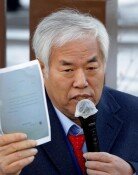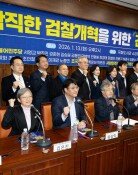U.S., China vie for influence in N. Korea
U.S., China vie for influence in N. Korea
Posted October. 23, 2000 14:10,
U.S. State Secretary Madeline Albright's first visit to North Korea has very important implications and has often been called by the news media as historic.
First of all, highly significant is North Korean Defense Commission Chairman Kim Jong-Il's one-on-one meeting with the visiting the U.S. secretary of state for the first time and attempt to address the pending issues between the two countries. This bilateral diplomatic contact could induce the long-isolated North to become a viable member of the newly fashioned international order.
However, the state of the current development is not so simple. The process of resolving the inter-Korean problems under the initiatives of the two Koreas since their June-15 summit has become complicated with intervention from the United States and China. This is eloquently demonstrated by the fact that the key government officials of the two countries are visiting the North simultaneously.
Beijing sent its Defense Minister Chi Haotian to Pyongyang, one day before Albright's North Korean visit. The Chinese minister's visit was said to be for the attendance to a ceremony marking the 50th anniversary of Chinese People's Army's intervention in the 1950-1953 Korean War. But considering that the anniversary falls on Nov. 25, Chi's advanced visit is viewed as being associated with the Albright coming.
Diplomatic experts speculated that Beijing and Pyongyang might have made a certain policy coordination or deal prior to the visit by the U.S. secretary of state.
This analysis is concerned with the fact that Washington has felt a sense of alienation since the inter-Korean summit in Pyongyang, while Beijing reportedly has played a behind-the-scene role in the South-North rapprochement. Washington might have regretted losing its diplomatic initiatives toward the North since the inter-Korean summit talks, thus being put on the sideline of addressing the Korean question. At the same time, the United States might have become irritated to see that China had played a positive role in the realization of the inter-Korean summit and consequently has come to exercise a greater influence on the Korean problems.
This China-U.S. diplomatic competition is likely to be extended beyond the end of the Albright's Pyongyang visit. Albright's trip is said to be closely related for the preparation for Clinton's North Korean visit, giving rise to speculation that the American president would come to Pyongyang in November. But his anticipated visit could be readjusted in connection with the expected Chinese President Jiang Zemin's North Korean visit. Chinese Foreign Minister Tang Jiaxuan suggested Oct. 21 that Jiang would come to the North early next year.
Due to the two powers' sudden high-geared diplomatic shifts toward the North, the fledgling inter-Korean rapprochement might be obliged to change its course in an untoward direction, some experts forecast.



![[속보]윤석열 사형 구형…내란특검 “전두환보다 엄정히 단죄해야”](https://dimg.donga.com/c/138/175/90/1/wps/NEWS/IMAGE/2026/01/13/133151283.1.jpg)



